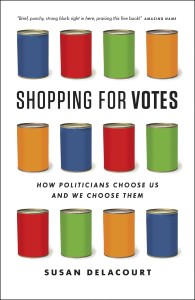
After reading Susan Delacourt’s “Shopping for Votes,” I want to ask Angelique Wood what insider information the party is giving her about voters in the Similkameen Valley. Wood is the NDP candidate running hard in the Central Okanagan Similkameen Nicola riding. She is also my neighbour, only two doors removed. It’s a question I hope to ask of the Liberal and Conservative candidates as well. Not having deep pockets, the Green Party doesn’t have the means to employ the expensive strategies and tactics described by Delacourt.
An award winning journalist with the Toronto Star, Delacourt provides a fascinating, but also disquieting account of how political parties endeavour to secure our votes. Her information reinforced my one cardinal rule concerning how I vote. The rule is, “I will not give my heart to any political party.”
Tactics and strategies of political parties have changed radically since the days when my parents voted faithfully for W.A.C. Bennett and Social Credit. According to Delacourt, the three major parties at the federal level now employ sociologists, statisticians, advertising experts, pollsters, and mass communication experts.
Like major corporations, they enthusiastically embrace the practise of “data mining” and “micro targeting.” The major parties all have systemized data bases which assemble contact information. Door-to-door canvassers are instructed to watch for indications of what might be important to the people of a neighbourhood. Children’s toys, camping equipment and golf clubs are examples. Canvassers may also report political lawn signs, doors slammed, a willingness to engage in political discussion etc.
Possessing this information helps party strategists make decisions about where to devote time, or what issues to emphasize in a particular riding or neighbourhood. Delacourt notes that one party sent a Jewish woman a greeting card at the time of the Jewish New Year.
Graham Fraser in “Playing for Keeps,” suggests political campaigning has become much like a corporate advertising campaign. Although politicians likely don’t consider it amusing, pollster Martin Goldfarb compared the selling of a candidate to selling cans of tomatoes.
Apparently the practises of data mining and micro targeting are just too powerful to resist. After the 2008 election, the New Democratic Party hired the polling firm, Viewpoints Research. They wanted a demographic profile of people who might be swayed to the NDP with the right marketing effort. It would be interesting to know how early socialist leaders like J.S Woodsworth, Stanley Knowles and M.J. Coldwell would view such maneuvering.
One benefit of data mining for political parties, according to Jeffrey Stevens is that “the 3 leaders, properly briefed, are able to make stage managed public appearances without falling into the orchestra pit.” One negative aspect, in Stevens view, is that “we learn nothing about which man would make the best P.M. or how he would conduct himself in high office.”
Politicians have long had a reputation for telling voters what they want to hear. Now with data mining and micro targeting, they can craft their messages with laser like accuracy to appeal to specific communities here in the Similkameen Valley. Unfortunately, too often the resulting promises come more from a thirst for power, than from a commitment to follow through.
Regarding political promises, Delacourt reminds us that before the 1974 election, Pierre Trudeau promised not to legislate wage and price controls. After the election he did impose price controls. Finance Minster John Turner added 10 cents and then another 5 cents to the price of gasoline. Delacourt goes on to say that in his 1995 budget, Jean Chretien cut health and social transfers to the provinces, a move contrary to public wishes.
Data mining tends to produce “designer policies”, whose purpose is to attract specific groups, or to please the party’s core supporters. Writing in the National Post, Attorney Edward Greenspan (1944-2014) and criminologist Anthony Doob suggest that “criminal justice policy is a product being shaped by the need to attract voters. Conservative criminal justice policy is developed not to serve public or societal needs, but to help market the Conservatives to specific constituencies.”
Although the political strategies described in “Shopping For Votes” may unsettle us, I don’t feel they are a reason to stay home on voting day. Rather, they’re a reminder for Canadians to listen with discernment and then vote in droves. It is important for politicians to understand we are alert and will be actively assessing their policies and decisions.

One thought on “Politicians Are “Shopping For Votes””